Overview
Optimizing accounting document management is crucial for enhancing efficiency and ensuring compliance. By adopting advanced document management systems and implementing workflow automation, accounting professionals can significantly improve their operations. These strategies not only streamline processes but also lead to substantial time savings and improved client engagement.
For instance, one accountant saved an impressive 288 hours in a single tax season by utilizing these streamlined methods. This case exemplifies the transformative impact of efficient document management, demonstrating how such innovations can redefine success in the accounting field.
Introduction
In the dynamic realm of accounting, effective document management stands as a critical pillar for success. As firms confront escalating regulatory demands and the imperative for operational efficiency, embracing advanced document management systems has transitioned from being optional to essential.
Solutions like Glasscubes lead the way, delivering streamlined processes that not only boost productivity but also guarantee compliance and security. With features crafted to automate workflows, enable real-time collaboration, and protect sensitive data, accounting professionals are uncovering remarkable time savings and enhanced client engagement.
As organizations navigate the intricacies of modern accounting, prioritising innovative document management practices will be crucial for thriving in a competitive landscape.
The Importance of Document Management in Accounting Firms
Effective accounting document management is crucial for accounting firms, significantly impacting operational efficiency and ensuring compliance with regulatory standards. A well-structured accounting document management system (DMS) empowers accountants to effortlessly store, retrieve, and manage documents, thereby minimising time spent on administrative tasks. The company exemplifies this with its user-friendly interface, enabling easy setup without training and automated customer communications that streamline information gathering and enhance customer engagement.
Its features, such as unlimited file requests and customisable automated reminders, ensure that vital information is not lost in busy inboxes, significantly reducing the time spent on follow-ups. Productivity tools like optical character recognition and custom automations for file routing can further enhance efficiency. Firms that have implemented robust accounting document management solutions, such as Glasscubes, experience substantial time savings, allowing them to concentrate on higher-value activities, like offering client advisory services.
Sophie Montgomery from TaxAssist Accountants reported an impressive 288 hours saved in just one tax season due to optimised handling processes. Additionally, a significant majority of organisations (89%) are adopting cloud-based management solutions to improve access to information and streamline collaboration, with expectations that this shift will enhance business agility and resilience. With regulatory scrutiny on the rise, effective accounting document management is essential for maintaining organised and accessible records to avoid compliance issues and potential penalties.
By focusing on accounting document management, financial firms can not only boost their overall efficiency but also enhance customer satisfaction, strategically positioning themselves for future challenges in the sector. Furthermore, statistics indicate that over 50% of accounting executives anticipate that the development of automated and intelligent accounting systems will significantly transform accounting businesses over the next 30 years, reinforcing the necessity of adopting advanced accounting document management practices now. In this context, the platform stands out with its seamless communication capabilities and automated features, optimising workflows and improving customer satisfaction.
Importantly, the platform provides a subscription-based model with a 30-day free trial, allowing firms to evaluate its fit for their needs without immediate commitment. Security is also a top priority, as Glasscubes ensures that all customer data is secure, encrypted, and compliant with GDPR regulations, providing peace of mind for financial firms.
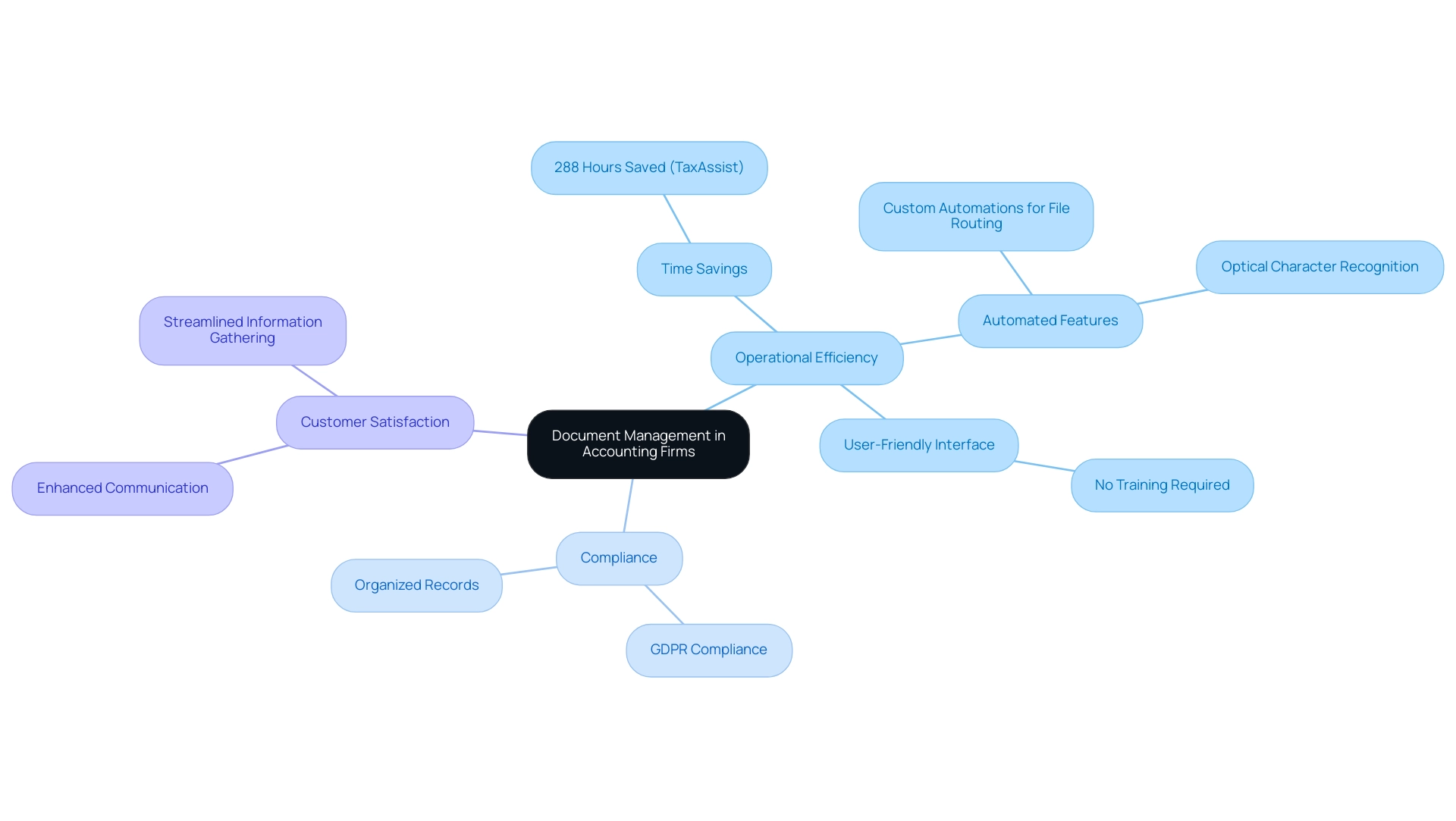
Leveraging Electronic Signatures for Efficient Document Handling
Electronic signatures have fundamentally transformed accounting document management within firms by providing a fast and secure method for acquiring approvals from customers. By eliminating the necessity for physical signatures, firms can expedite essential processes, such as contract approvals and tax filings. Platforms like DocuSign and Adobe Sign empower accountants to send files for electronic signature, track their status in real time, and ensure compliance with legal standards. This compliance is vital, considering that GDPR fines can reach €20 million or 4% of a firm’s previous year’s global annual revenue.
This transformation not only enhances customer satisfaction through expedited services but also improves document management by reducing risks associated with lost files and processing delays. Users like Sophie Montgomery from TaxAssist Accountants have reported an impressive 288 hours saved in just one tax season due to improved document handling processes. Moreover, similar platforms enhance workflows by simplifying audit communication, boosting customer engagement, and providing real time visibility into information requests.
As emphasised by Steve Baxter from MGI, clients value the transparency of having all information consolidated in one location, leading to quicker responses through automated reminders. The platform effectively addresses common pain points such as duplicated requests and lack of visibility by ensuring that all correspondence is neatly archived and accessible. This not only enhances document management but also promotes a more organised approach to audits. Embracing electronic signatures, along with innovative solutions like Glasscubes, stands as a crucial best practice that can yield significant time savings and bolster overall operational efficiency in accounting document management.
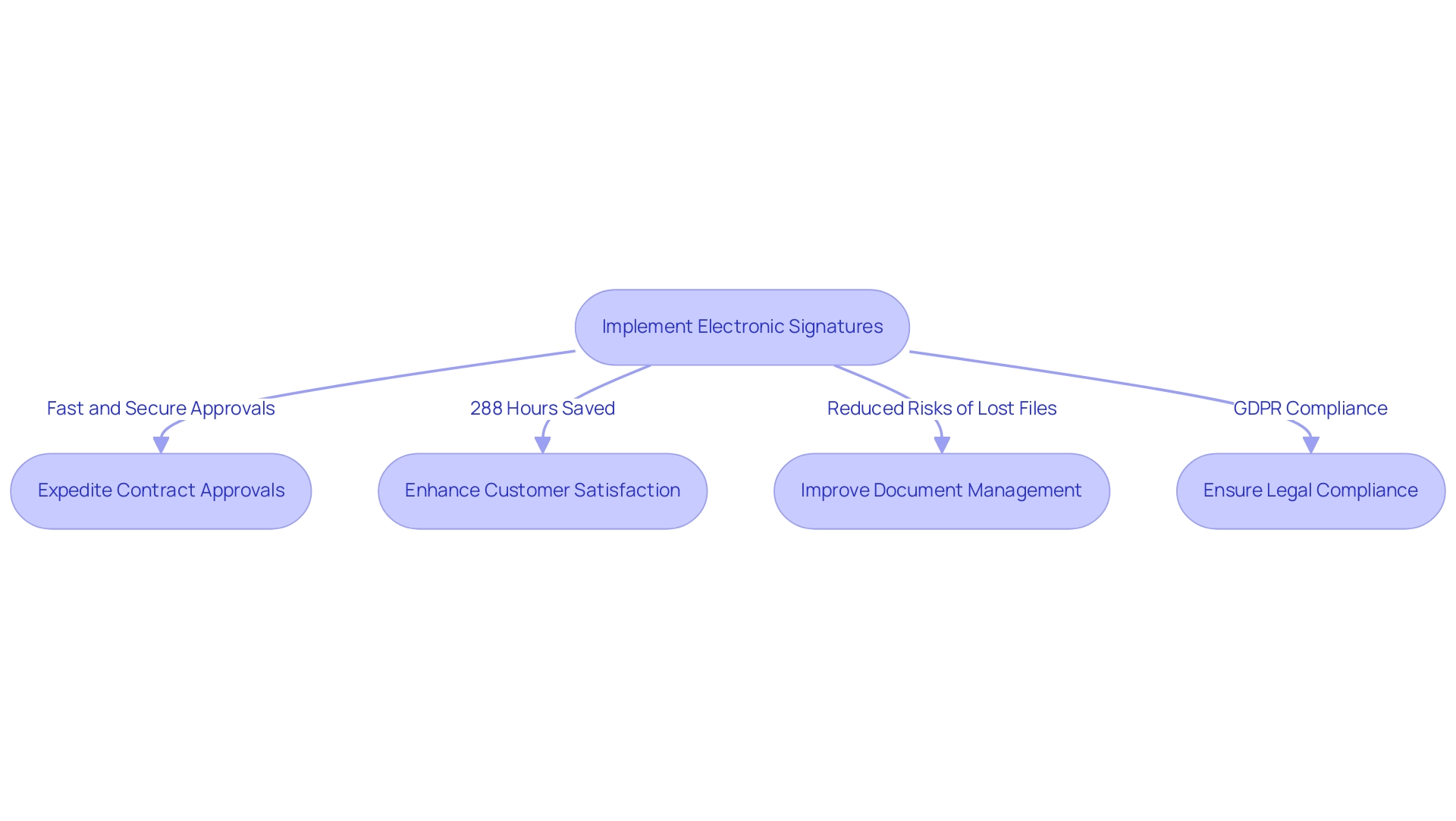
Ensuring Regulatory Compliance and Data Security in Document Management
In the accounting profession, the management of accounting documents, regulatory compliance, and data security are paramount. Firms must navigate a complex landscape of regulations, including GDPR and various data protection laws, which mandate the secure management of customer information. A significant 27% of security and IT professionals have ranked mitigating internal audit fatigue as a top compliance challenge, underscoring the urgency of these issues.
Before adopting the platform, client information requests often relied on lengthy email exchanges, leading to lost information and duplicated requests, as different team members would sometimes ask for the same data. By switching to this platform, financial firms can simplify communication and improve engagement through automated processes and immediate reporting. Key features such as encryption, access controls, and detailed audit trails are vital in accounting document management to safeguard sensitive data against unauthorized access and data breaches.
Moreover, the platform’s ability to provide built-in security measures, such as 2-Factor authentication and IP Location Lockdown, further enhances data protection. Regular training for staff on compliance protocols and data security best practices fosters a culture of awareness and strengthens a firm’s ability to maintain trust and integrity in its operations. The financial consequences of non-compliance can be severe, with the total estimated cost surpassing £14 million, and organisations losing an average of £4 million in revenue per non-compliance incident, emphasising the significance of effective management.
By prioritising these elements and utilising the features of the platform, firms can effectively mitigate risks related to non-compliance while significantly enhancing their operational efficiency through accounting document management. As noted by Sophie Montgomery from TaxAssist Accountants, implementing robust systems can lead to substantial time savings, reporting an impressive 288 hours saved in just one tax season.
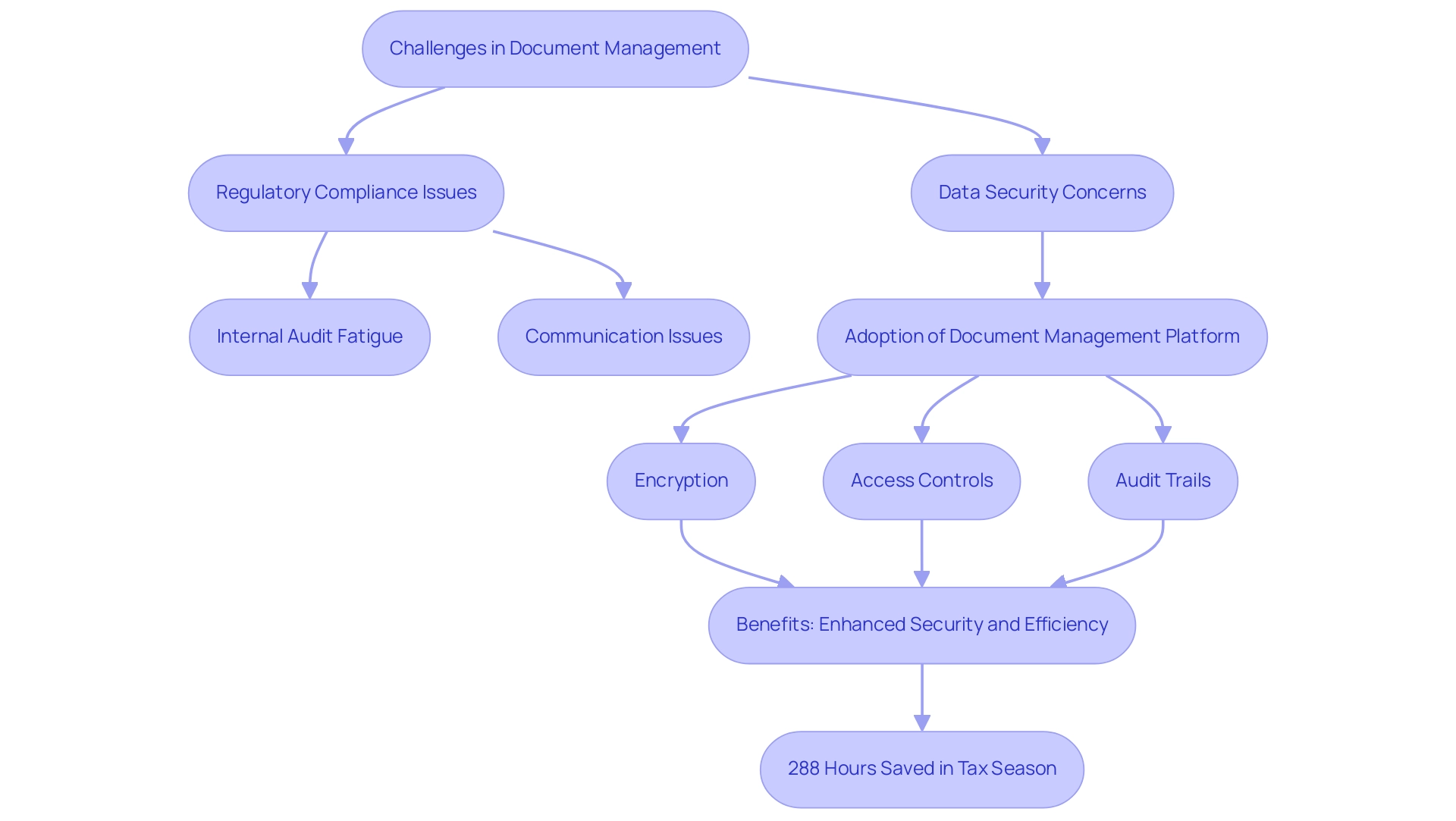
Enhancing Collaboration and Document Retrieval Through Technology
In the realm of accounting document management, technology stands as a cornerstone for fostering collaboration and streamlining information retrieval. The cloud-based accounting document management system empowers teams to access and share vital documents in real time, regardless of their geographical location. Its features significantly transform client engagement, with automated reminders pursuing late or missing items, ensuring that responses are not lost in busy inboxes.
Unlike conventional email, which often leads to lost inquiries and duplicated requests, this platform organises correspondence within each audit request, providing a clear structure for outstanding items. By integrating platforms like Microsoft Teams or Slack with other tools, firms enhance communication and facilitate collaborative work on projects. Furthermore, advanced search features enable accountants to swiftly locate necessary documents, minimising downtime and enhancing response times to inquiries by an impressive 50%.
Firms utilising such technologies have reported a remarkable 71% increase in project success rates, underscoring the effectiveness of these tools in accounting document management. Professionals like Sophie Montgomery from TaxAssist Accountants emphasise the impact of these tools, reporting an impressive 288 hours saved in just one tax season. This demonstrates how embracing collaborative tools fosters a united team atmosphere, resulting in enhanced customer outcomes and satisfaction.
Additionally, with its secure, encrypted, and GDPR-compliant features, this platform ensures peace of mind for firms and clients alike, optimising client engagement while eliminating the inefficiencies traditionally associated with email communication.
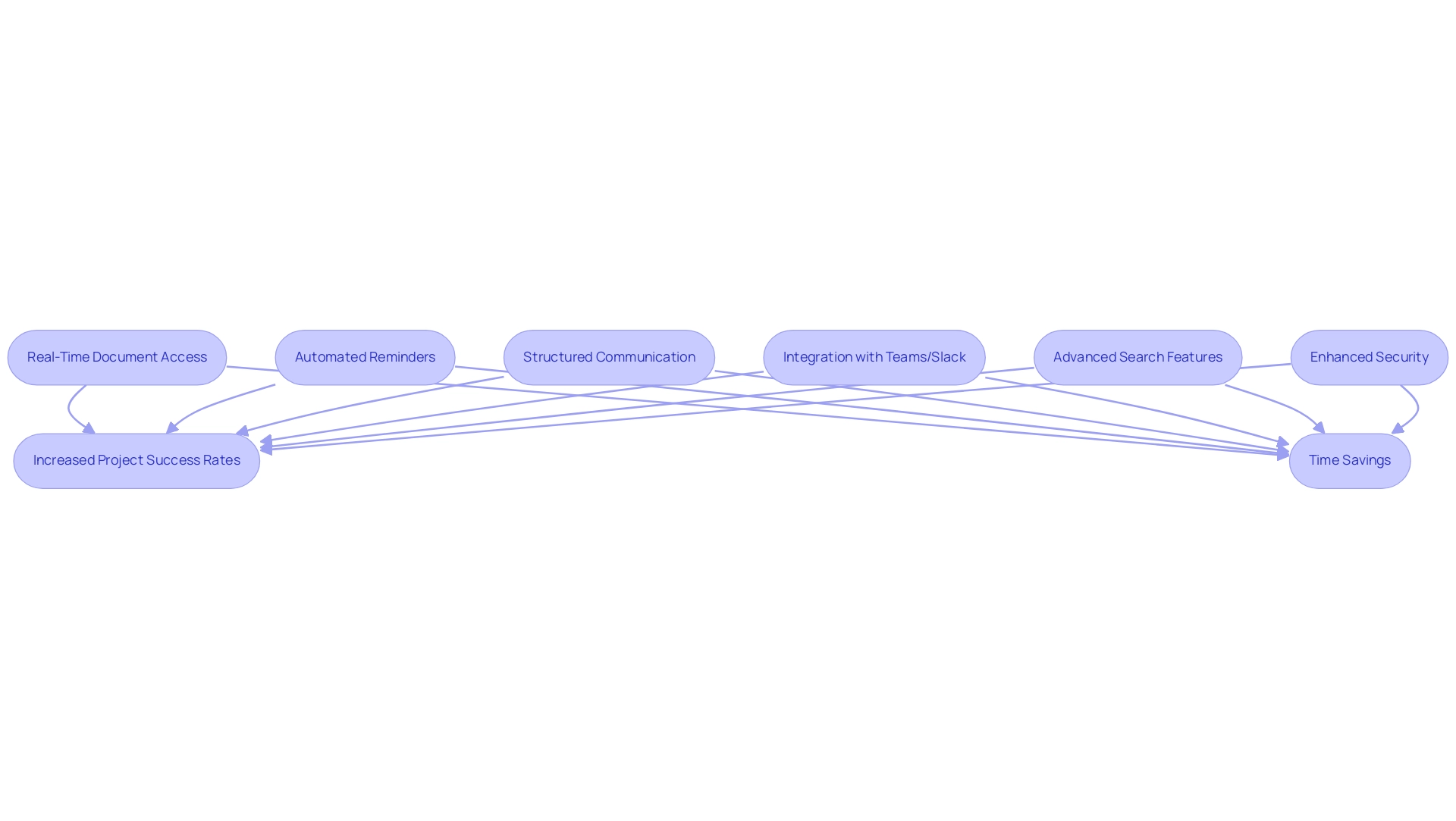
The Role of Workflow Automation in Streamlining Document Processes
Workflow automation is revolutionising the way accounting firms manage their processes, serving as an essential tool for enhancing efficiency and compliance in accounting document management. By automating routine tasks such as file routing, approvals, and notifications through these advanced platforms, firms can significantly minimise manual errors and optimise operations. Utilising Glasscubes’ secure file request portals enables accountants to create predefined workflows that automatically direct files to the appropriate team members for review and approval, while automated reminders ensure that no requests are overlooked.
Moreover, features like real-time reporting and task management offer clear visibility into outstanding requests, thereby enhancing accountability and organisation. This method not only accelerates the document handling process but also guarantees that every necessary step is consistently adhered to, fostering thoroughness. Notably, 45% of business teams play crucial roles in building automation, highlighting its significance in the finance sector.
Firms that embrace workflow automation, particularly those utilising comparable tools, are witnessing remarkable productivity enhancements. For example, Sophie Montgomery from TaxAssist Accountants reported that her firm saved an impressive 288 hours in just one tax season, showcasing the tangible advantages of this technology. Additionally, the case of CashCo Financial exemplifies successful implementation, where the integration of automation resulted in a 26% increase in approved loans and substantial operational efficiency gains.
As the global market for accounting software is projected to grow, the integration of accounting document management through automation within document processes—similar to solutions offered by other platforms—has become increasingly vital for companies striving to enhance their efficiency and accuracy in financial transactions. Unlike traditional email methods, which frequently lead to misplaced information and a lack of visibility, Glasscubes delivers a secure, organised, and comprehensive solution. With pricing options that cater to diverse needs, firms can select a plan that aligns with their budget while enjoying the benefits of improved client engagement and streamlined workflows.
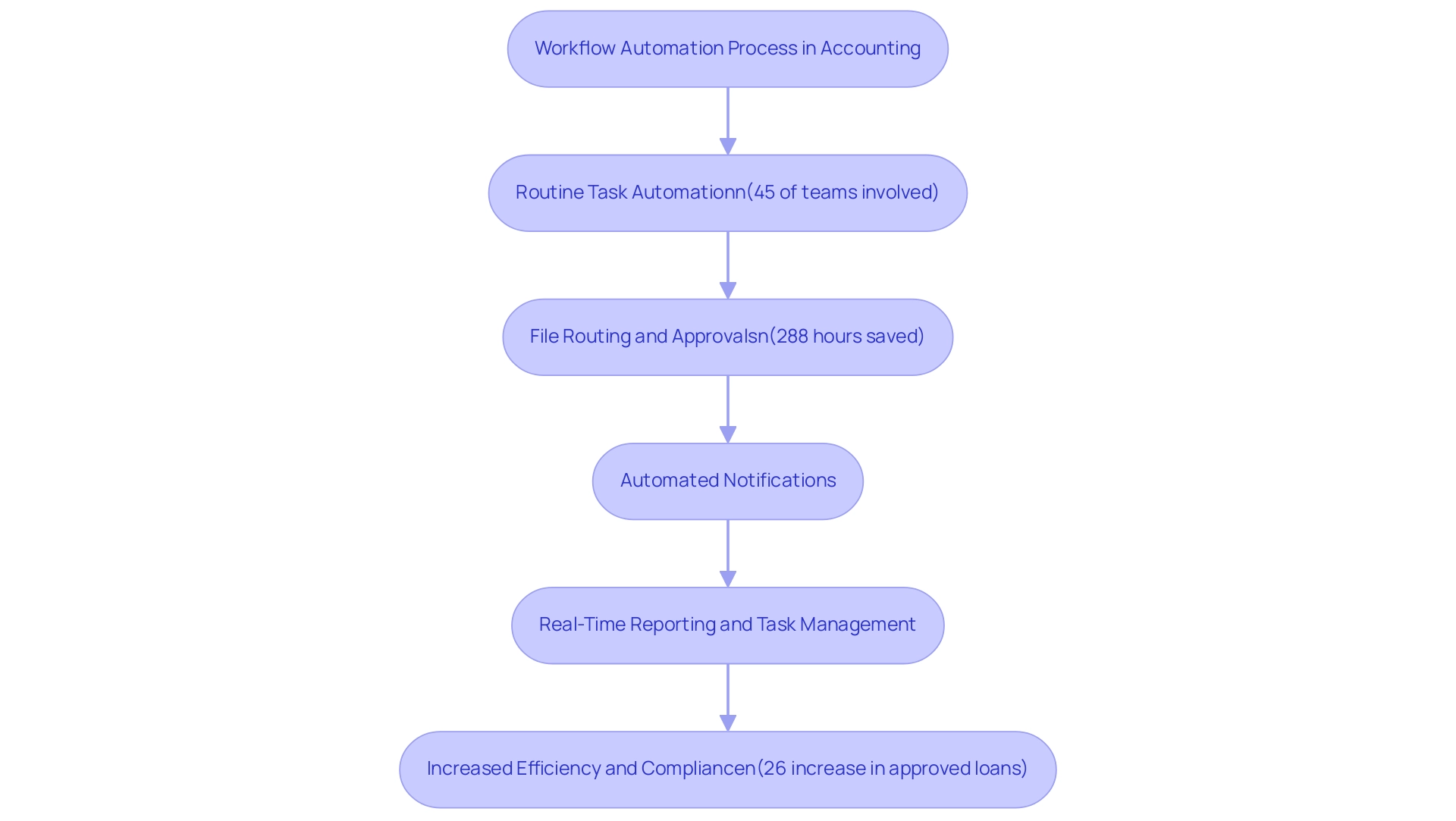
Integrating Document Management Systems with Accounting Software
The integration of document management systems (DMS) with contemporary financial software is crucial for effective accounting document management and fostering a seamless workflow. The company exemplifies this synergy by automating data collection through secure file request portals, significantly reducing the need for manual data entry and minimizing potential errors. When a client uploads a file into the portal, it can automatically populate relevant fields in the accounting document management system, thereby simplifying the entire process.
With the document management software market valued at $2.79 billion in North America, the importance of these integrations is unmistakable. Recent trends reveal that 73% of businesses adopted a hybrid cloud approach in 2023, highlighting the value of integrating flexible and secure solutions like Glasscubes. Firms must prioritise selecting DMS solutions that enhance accounting document management with robust integration capabilities, particularly with popular accounting platforms such as QuickBooks and Xero.
This strategic approach not only boosts productivity but also ensures that all team members have real-time visibility into the most current information, fostering a more organised and efficient workplace. Sophie Montgomery from TaxAssist Accountants underscores the efficiency of record management practices, reporting an impressive 288 hours saved in just one tax season due to streamlined processes. Organisations are encouraged to evaluate their existing management systems and invest in training and security, as detailed in the case study ‘Preparing for the Future of Management,’ which emphasizes the significance of a comprehensive strategy in adopting accounting document management solutions.
Furthermore, the platform offers a monthly subscription plan that delivers unlimited requests and storage, making it a worthwhile investment for finance professionals. With the potential to save up to two hours per client, the platform is designed for ease of use, allowing clients to upload files without needing to log in, thereby enhancing their engagement and responsiveness.
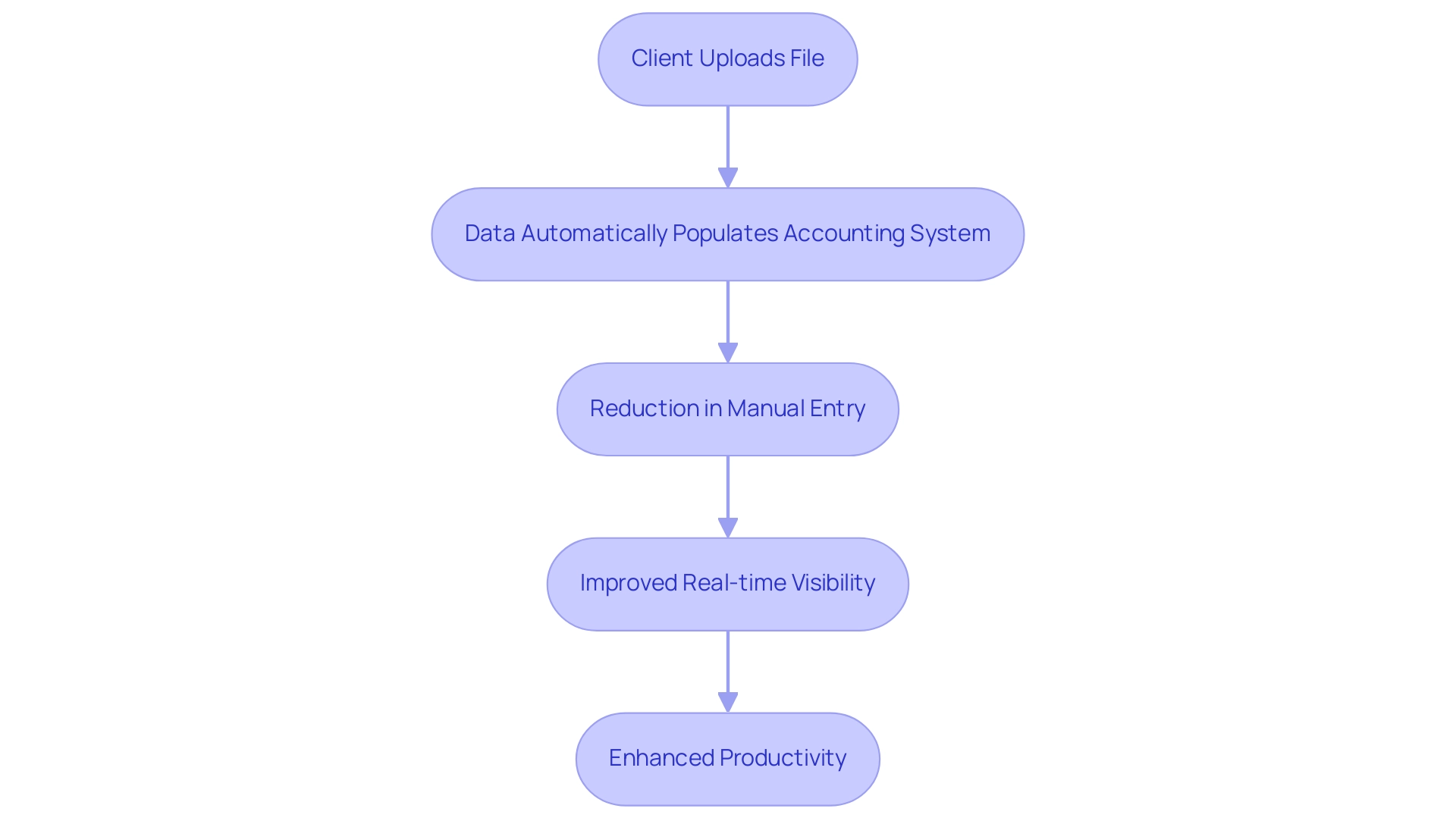
Future Trends in Accounting Document Management
Looking ahead, the landscape of accounting document management is poised for transformation, driven by several key trends, particularly through the innovative solutions offered by Glasscubes. The integration of artificial intelligence (AI) and machine learning is set to revolutionise processing, facilitating automated data extraction and intelligent classification. These advancements empower firms to manage documents with unprecedented efficiency, significantly reducing manual intervention and errors.
Companies employing this platform have reported a remarkable 50% reduction in response times and a 40% increase in customer interaction, showcasing the efficiency gains associated with adopting such technologies. Furthermore, the continued rise of cloud-based solutions enables remote access and seamless collaboration among accounting teams, which is critical in today’s flexible work environments.
As regulatory requirements tighten, the importance of data security and compliance cannot be overstated. Glasscubes ensures adherence to evolving regulations with its secure, encrypted, and GDPR-compliant platform, promoting peace of mind for both firms and their clients.
To improve efficiency while safeguarding sensitive information, companies must remain vigilant in adjusting their management strategies. For instance, hyper workflow automation allows organisations to create intelligent workflows that adapt in real-time based on document types and metadata, significantly enhancing efficiency in processes like contract management and accounts payable. Additionally, Glasscubes facilitates automated reminders and organised replies from customers, ensuring that no requests are overlooked and enhancing overall communication.
By embracing these trends, financial firms can position themselves favourably, leveraging technology to enhance operations while fostering strong customer engagement. User testimonials, such as that from Sophie Montgomery of TaxAssist Accountants, who reported an impressive 288 hours saved in just one tax season, further illustrate the tangible benefits of improved file management. The future of accounting document management is not merely about keeping pace; it’s about leading the way in efficiency, compliance, and client engagement.
Traditional email communication often leads to missed responses and disorganised information; however, Glasscubes provides a structured platform where all correspondence is contained within each audit request, effectively eliminating these limitations.
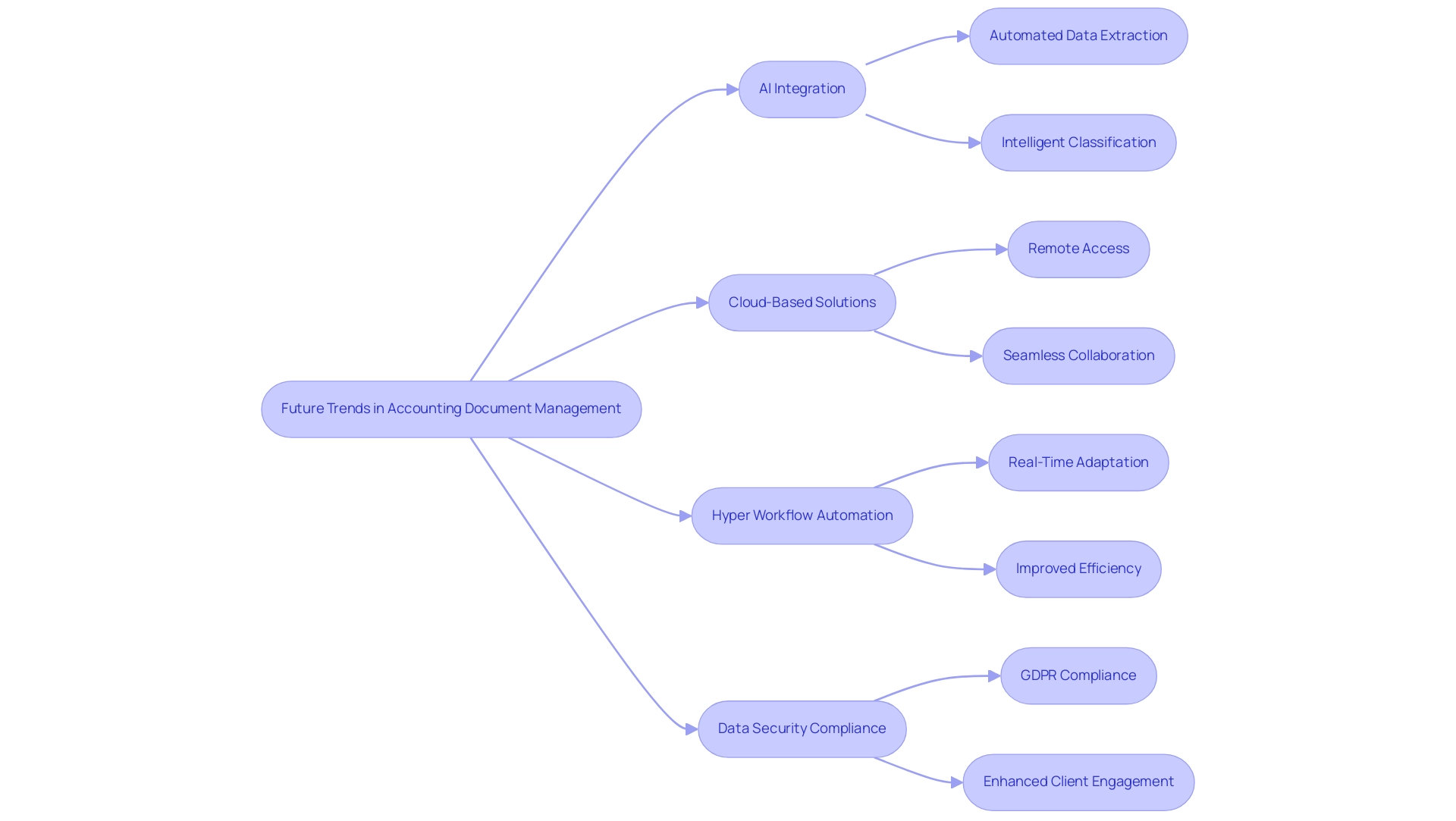
Conclusion
Effective document management stands as a cornerstone of success in the accounting industry. As highlighted throughout this article, implementing advanced systems like Glasscubes significantly enhances operational efficiency, streamlines compliance with regulatory standards, and bolsters client satisfaction. By automating workflows, facilitating real-time collaboration, and ensuring data security, accounting firms are not only saving valuable time—illustrated by the remarkable 288 hours saved by professionals like Sophie Montgomery—but also strategically positioning themselves for the future.
The integration of electronic signatures and workflow automation exemplifies how technology is transforming document handling and communication within firms. These innovations expedite processes while reducing the risks associated with lost documents and compliance failures. As organisations increasingly adopt cloud-based solutions, the benefits of enhanced accessibility and collaborative capabilities become evident, allowing teams to work seamlessly regardless of location.
Looking ahead, trends shaping the future of document management—such as the incorporation of AI and machine learning—promise to revolutionise the operations of accounting firms. By embracing these technologies, firms can significantly improve efficiency, maintain compliance, and enhance client engagement. The call to action is clear: prioritising innovative document management practices is not merely a matter of convenience; it is essential for thriving in a competitive landscape. Accounting firms that leverage these advancements will not only meet the challenges of today but will also lead the way in shaping the future of the industry.
